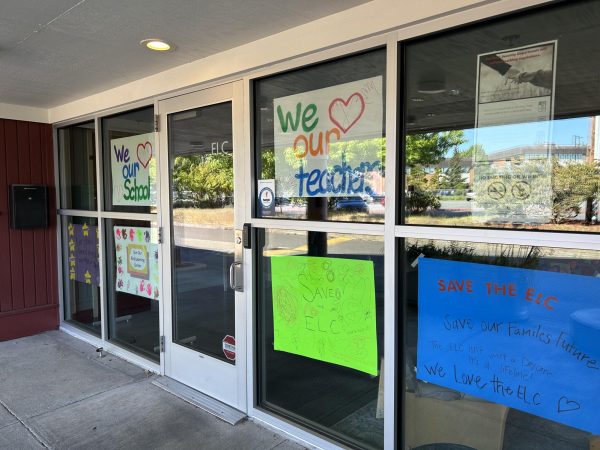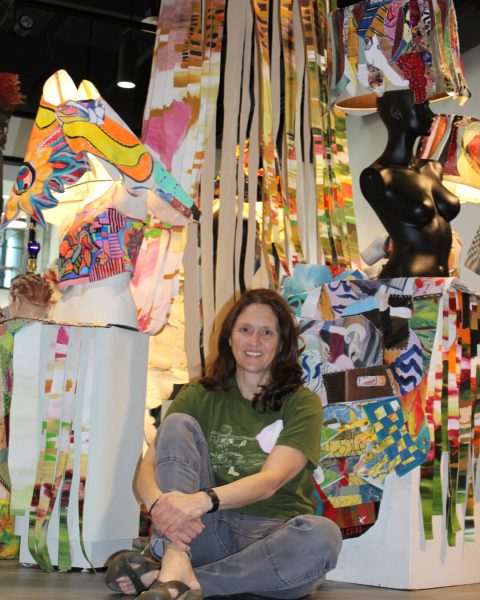EvCC’s Nursing Department: Teaching Healthcare During a Pandemic
Students and staff of the EvCC nursing department weigh in on how the learning environment has changed during the COVID-19 pandemic.
Quarantine and strict stay-at-home orders have pushed all college classes online which has been a struggle for many students and instructors alike. The EvCC nursing department is feeling the impact just as much, if not more, than anyone else.

Amber Baxter, who teaches fourth-quarter nursing students at EvCC.
With the move of all college classes to an online format, it was uncertain if nursing students were going to be able to graduate on time. Depending on what degree they’re getting, nursing students are required to have a minimum of 500 to 600 clinical hours in order to be certified as a registered nurse in Washington State.
Amber Baxter, who teaches fourth-quarter nursing students, explains the changes that have been implemented to the nursing program this quarter saying, “They usually go to various healthcare settings in the community and they work with nurses to practice what they’ve learned, practice with real patients and learn more. That is not an option this quarter, so we have had to find virtual opportunities for them to replace their clinical opportunities.”
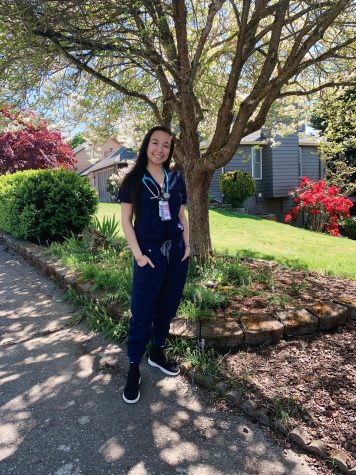
Sophia Youk, a sixth-quarter nursing student at EvCC.
Even with nursing students being provided with high-quality online learning resources for their clinical rotations, they are still missing out on real-life experiences. “Students typically get to see a baby be born and care for a mother in labor as well as the newborn baby. We’ve given them videos and high-quality learning content, but it’s just not the same,” says Baxter.
Nursing students have also expressed their concern about entering the nursing field without having the proper hands-on experience they would normally be receiving through clinical rotations. “It’s a little relaxing knowing that I don’t have to do 12-hour shifts but at the same time I feel unprepared,” says sixth-quarter nursing student Sophia Youk.
Due to the hands-on learning associated with the nursing program, EvCC decided not to admit a new set of students for spring quarter. “We were unable to admit a first-quarter because there’s so much hands-on touching each other and listening and learning how to do a head-to-toe assessment,” explained Kristi Boyd, who teaches the EvCC nursing department’s evening program.
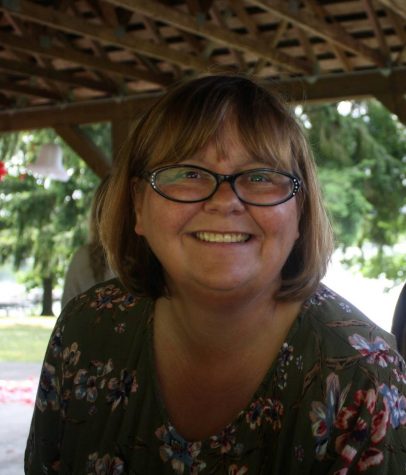
Vanessa DePuente, who teaches sixth-quarter nursing students.
Even with the drastic move to online, nursing instructors have continued to provide students with the tools they need to become successful nurses. Vanessa DePuente, who teaches sixth-quarter students about becoming professional nurses says, “We’re still talking about things like communication, teamwork, leadership management, things like that. So, the content is the same, the delivery we’re just doing that over Zoom.”
With news of COVID-19 being circulated everywhere daily, nursing instructors have been trying to find meaningful ways to teach it without adding to student stress. “It’s in everybody’s face, it’s in the media, you can’t get away from it. I want to make it a meaningful lesson and not something that’s going to increase the burden of the disease information out there right now,” says Boyd.
Sixth-quarter nursing students were allowed back on-campus during the third week of spring quarter to attend an intravenous therapy (IV) lab, where they learned how to administer an IV. Although, due to social distancing, even that had to be done on a mannequin instead of a classmate.
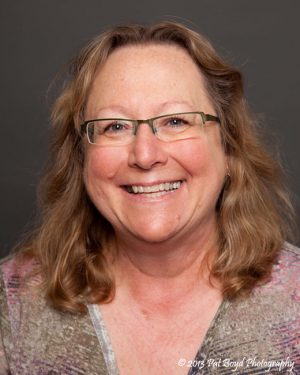
Kristi Boyd, who teaches EvCC’s evening nursing program.
“Even though we weren’t able to do it with each other, which sucks because that’s usually a huge milestone… to be able to do it on a mannequin and have that muscle practice was super beneficial and way better than anything you could do online,” said Youk.
In addition to the stress of school instructors and students alike are voicing concerns over friends, colleagues and classmates who are working at hospitals and therefore being directly exposed to COVID-19.
“When you work in healthcare you really understand, more than just about anybody, how bad it is and how bad it could be,” said Baxter. “It’s going to result in a lot of healthcare workers who are burnt out, who have PTSD and I think that as a society we really need to recognize that the long-term effects of this are going to stay with people for a long time. Whether you lost somebody yourself or whether you’re caring for those who are ill, it’s hard.”
Students who are in their sixth and final quarter of the nursing program are also expressing concern about working at hospitals after graduation. “We have to enter this field in the next couple of months and as excited as I am on the one hand it’s also a concerning time to be going in and that’s definitely stressful,” said Caitlyn Yousie, a sixth-quarter nursing student.
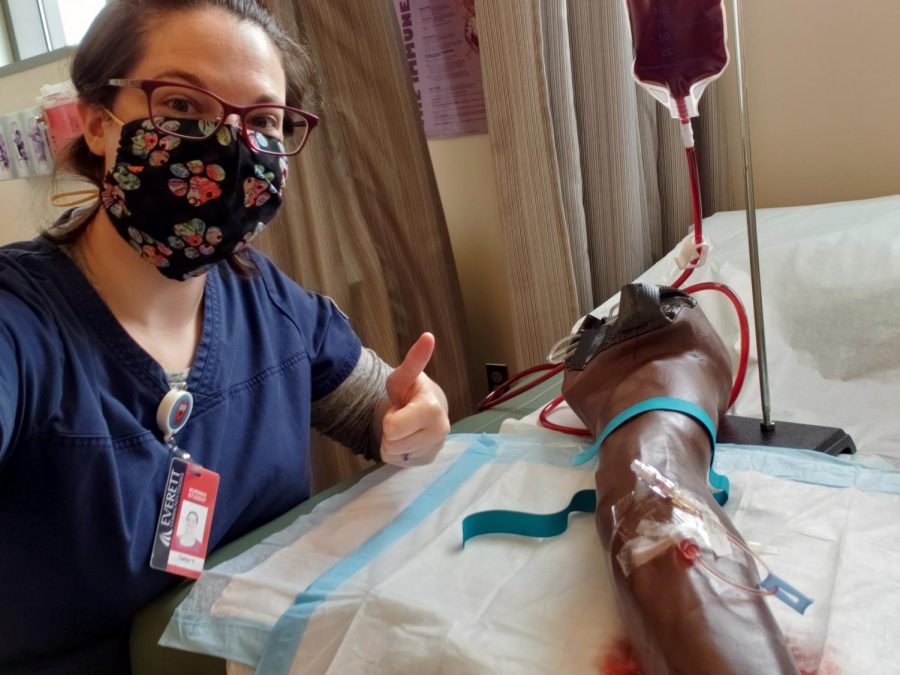
Caitlyn Yousie, a sixth quarter nursing student, practicing administering an IV into a mannequin arm.
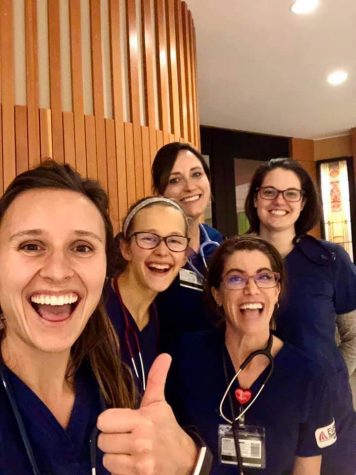
EvCC nursing student Caitlyn Yousie doing clinical rotations with her classmates during winter quarter.
Instructors and students alike are also voicing their wishes for people to continue to stay at home and follow the guidance of healthcare workers.
“There’s a lot of respect for healthcare workers and especially nurses right now. On the one hand, it’s nice to be seeing the recognition that our field has always deserved, but on the other hand it’s really frustrating to get respect for what you do but still be ignored for the advice that we’re giving communities,” says Yousie. “Like stay home, wash your hands and wear a mask. I think that they need to take healthcare recommendations more seriously. I wish that would happen.”

What interests you about journalism?
I have a passion for storytelling and journalism is one platform that I use to explore that passion. I do a...


